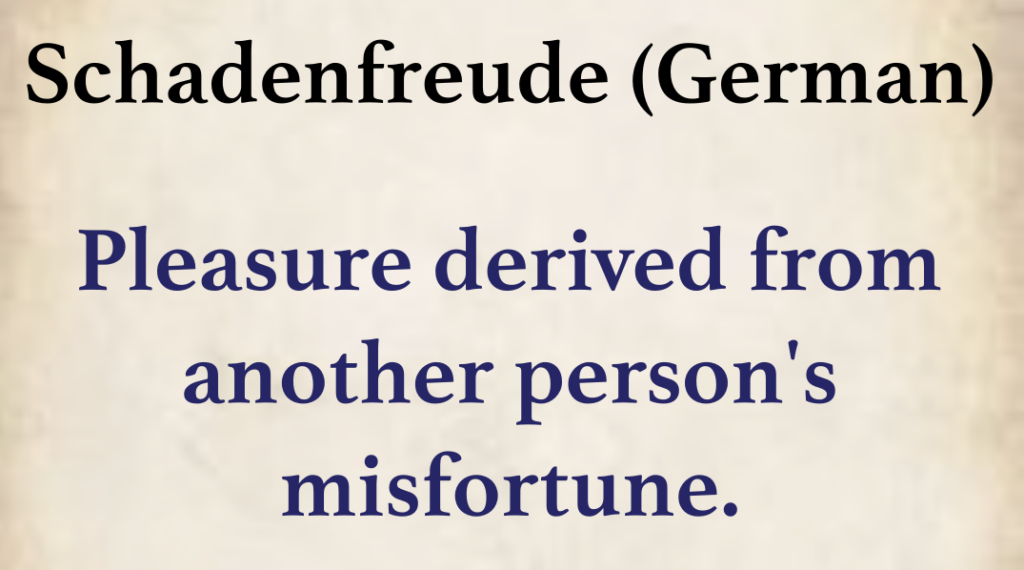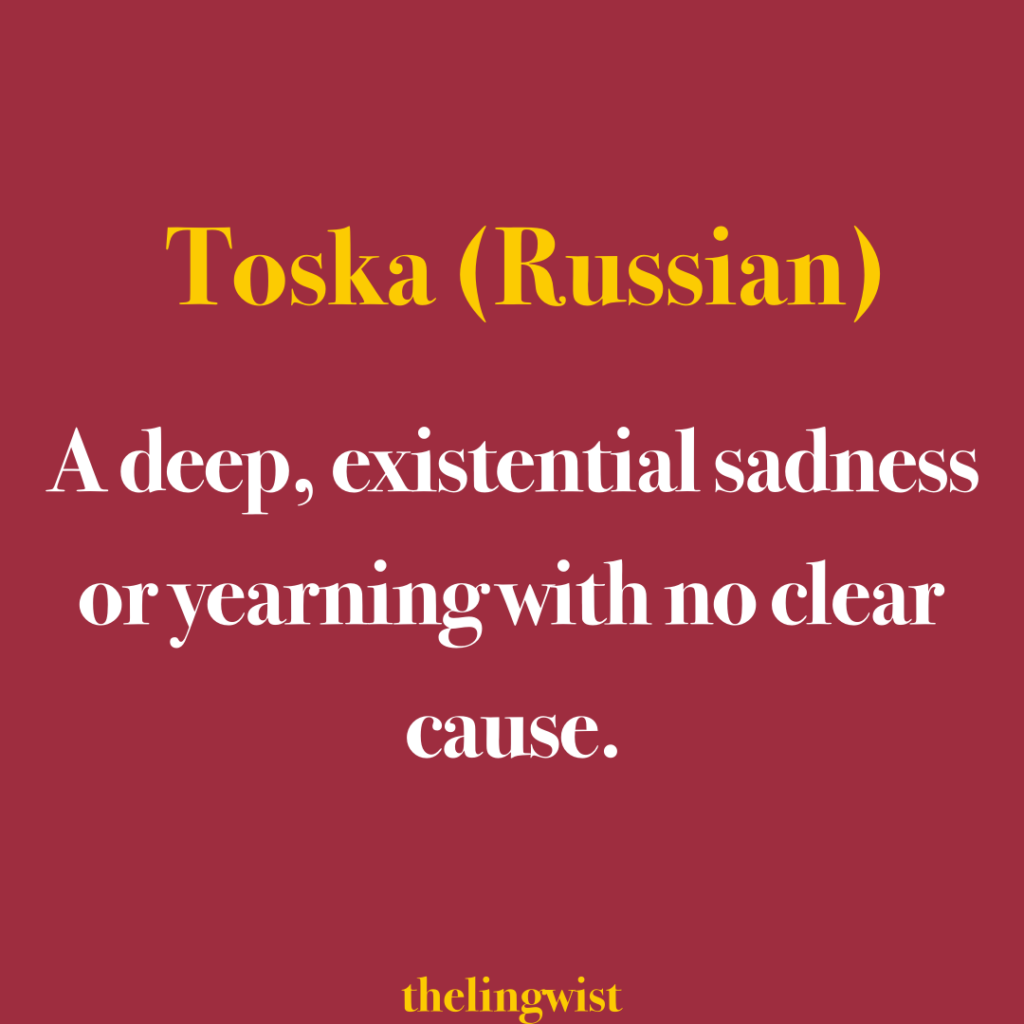Language is an incredible gateway to understanding the world, and sometimes, other languages offer us a glimpse into emotions we never knew we could name. Many foreign emotion words have no direct English equivalent—terms that capture intricate feelings shaped by culture, environment, and human experiences. These words give us insight into the nuances of emotions we all experience but may not fully recognize. This article will explore some of the most beautiful and evocative Foreign emotion words with no English equivalent.
Thank you for reading this post, don't forget to subscribe!Emotions That Don’t Exist In English
1. Saudade (Portuguese)
Meaning: A deep, melancholic longing for someone or something absent, often accompanied by a repressed knowledge that the object of longing may never return.
Cultural Significance: Originating from Portuguese and widely used in Brazilian Portuguese, saudade is a key part of the Portuguese and Brazilian soul. It evokes a bittersweet emotion tied to love, memory, and distance, and is deeply connected to the cultural experience of nostalgia and homesickness.
Example: “I felt saudade for my childhood summers, knowing they are memories I can never fully relive.”
2. Schadenfreude (German)

Meaning: The feeling of pleasure derived from witnessing someone else’s misfortune or pain.
Cultural Significance: While many people have experienced this emotion, few languages have a word for it as distinct as the German schadenfreude. This word combines schaden (damage) and freude (joy), giving the emotion a direct and precise name, even if it’s a bit uncomfortable to admit!
Example: “She felt a twinge of schadenfreude when her rival failed to secure the promotion.”
3. Iktsuarpok (Inuit)
Meaning: The feeling of anticipation when you’re waiting for someone to arrive, and you keep going outside to check if they’re there.
Cultural Significance: This word reflects the Inuit culture’s relationship with isolation and the significance of personal connections in vast, often desolate landscapes. It captures that particular impatience and excitement as you await a visitor, perhaps during long winters where human contact is treasured.
Example: “I felt a strong sense of iktsuarpok waiting for my friend to arrive at the cabin.”
4. Litost (Czech)
Meaning: A state of torment created by the sudden sight of one’s own misery, a feeling of deep regret, sorrow, and helplessness.
Cultural Significance: Czech author Milan Kundera popularized litost, a profound emotional state where one is painfully aware of their inadequacies or failures. It’s a feeling of sorrow that’s both personal and philosophical, reflecting on the human condition.
Example: “After seeing my old diary, I was overwhelmed with litost, reflecting on lost time and missed opportunities.”
5. Hygge (Danish)
Meaning: A deep sense of coziness, warmth, and contentment, often experienced when sharing simple pleasures with loved ones.
Cultural Significance: Hygge has become a cultural phenomenon, especially in Danish culture, where it represents an important aspect of daily life. It’s the feeling you get when you’re bundled up in blankets, sipping hot cocoa by the fire, or enjoying a meal with friends.
Example: “The snow fell softly outside, and inside, the hygge atmosphere of the candlelit dinner made everyone feel at home.”
6. Sisu (Finnish)
Meaning: A unique kind of strength, determination, and perseverance in the face of extreme adversity.
Cultural Significance: Deeply rooted in Finnish culture, sisu is a central concept that embodies their resilient spirit. It’s more than just physical courage—it’s mental toughness, the refusal to give up, even when the odds are stacked against you.
Example: “She showed incredible sisu when she continued to fight for her goals despite numerous setbacks.”
7. Mono no aware (Japanese)
Meaning: A bittersweet awareness of the impermanence of things, coupled with a gentle sadness or wistfulness.
Cultural Significance: Mono no aware is tied to Japanese aesthetics and the appreciation of fleeting beauty, such as cherry blossoms blooming only for a short time. It reflects a deep emotional sensitivity to the passage of time and the inevitability of change.
Example: “Watching the sunset, he was filled with mono no aware, knowing the moment would soon pass.”
8. Ubuntu (Zulu, Xhosa)
Meaning: A feeling of deep connectedness and humanity, emphasizing communal bonds and shared experiences.
Cultural Significance: Originating from the Bantu languages of South Africa, ubuntu is a philosophical concept that means “I am because we are.” It reflects a belief in a universal bond that connects all people, promoting compassion, kindness, and a sense of shared humanity.
Example: “The sense of ubuntu in the community was palpable as everyone came together to support one another.”
9. Kilig (Tagalog)
Meaning: The fluttery feeling of excitement you get when something romantic or cute happens.
Cultural Significance: In the Philippines, kilig describes the giddy rush of excitement you feel when you’re infatuated or charmed by someone. It’s a light, happy emotion often experienced during moments of budding romance.
Example: “She couldn’t stop giggling, her heart full of kilig, after receiving the unexpected love note.”
10. Toska (Russian)

Meaning: A deep emotional pain or anguish, often without a clear cause, a longing so intense it aches.
Cultural Significance: Russian literature and philosophy are often associated with toska, an existential form of melancholy that’s difficult to translate into English. It’s more than just sadness; it’s a yearning for something unknown or unattainable.
Example: “The gray skies and quiet streets filled me with toska, a feeling of longing I couldn’t quite explain.”
Conclusion
These foreign emotion words provide a fascinating window into the emotional landscapes of other cultures. Each term encapsulates feelings we’ve all experienced but never fully expressed because of the limitations of the English language. As we explore these unique words, we deepen our understanding of both human emotions and the cultures that shape them. It reminds us that while emotions are universal, how we define and interpret them can vary greatly across the world.
Incorporating these words into our emotional vocabulary helps us better articulate our feelings and connect with the richness of global experiences. Next time you feel a sense of melancholic longing or cozy contentment, remember—there’s likely a perfect word for that, somewhere in the world!
Are these foreign emotion words widely used in their respective cultures?
Yes, most of these words are integral to their respective cultures and are commonly used to express specific emotions. For example, saudade is deeply embedded in Portuguese culture, while hygge is a key concept in Danish life. These words help people express emotions that are otherwise difficult to describe.
Can English speakers use these foreign words in conversation?
Absolutely! Many English speakers adopt these foreign emotion words when they can’t find an exact equivalent in English. Words like schadenfreude and hygge have already entered the English lexicon. Using these terms can enrich conversations by capturing more nuanced emotions.
Why doesn’t English have equivalents for these words?
English, like all languages, has its limitations in expressing the full spectrum of human emotions. The absence of equivalent words often reflects cultural differences. Many of these foreign words are tied to specific cultural experiences and concepts that don’t directly translate into English but are still widely relatable.
Are there English words that don’t have equivalents in other languages?
Yes, every language has words that are unique and challenging to translate. For example, the English word serendipity doesn’t have a direct equivalent in many other languages. Likewise, words like home (which conveys a deep emotional connection to place) can be difficult to fully translate in a single word.
Read Also: 15 Funny and Mind-Bending Palindrome Examples You’ll Love!







